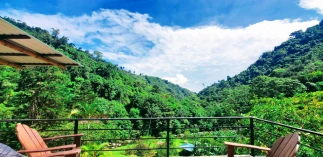While mountains may not be the first place you think of for spotting shorebirds, here at our Costa Rican retreat nestled amidst lush greenery, you might be surprised by a fleeting visitor – the White-rumped Sandpiper. These incredible long-distance travelers grace our ponds and wetlands with their presence during their remarkable migrations.
Tiny Travelers, Big Journeys
The White-rumped Sandpiper is a true globetrotter of the avian world. These small sandpipers, measuring just 7.8 inches (20 cm) in length, undertake one of the longest migrations of any North American bird. Their breeding grounds lie in the far north, on the Arctic tundra of Canada and Alaska. Come winter, they embark on a southward journey, some traveling an astounding 2,500 miles without a rest! This puts their stopover at our mountain retreat in Costa Rica right in the middle of their epic adventure.
Spotting the White-rumped Sandpiper
While these little shorebirds can be tricky to distinguish from other sandpipers, there are a few key features to look out for:
- Size: Slightly larger than the similar “peep” sandpipers they often mingle with.
- Coloration: In breeding plumage, they sport a sharp contrast of brown and white with rusty highlights and dark speckles on the breast. In non-breeding plumage, they appear duller brown above and lack the rusty tones.
- The Give-Away: The key to identifying a White-rumped Sandpiper is its namesake – the white rump! This is actually formed by the uppertail covert feathers, which are white at the base and contrast with the darker tail feathers. It’s most visible when the bird is in flight.
Birders Paradise
If you’re a bird enthusiast visiting our retreat, keep your eyes peeled near the ponds and wetlands. With a little patience, you might be lucky enough to spot a White-rumped Sandpiper flitting about, its tiny legs probing the mud for insects and its wings flashing white as it takes flight.
Even if you don’t manage to see one, the knowledge that these incredible long-distance migrants grace our retreat with their presence adds another layer of wonder to the Costa Rican birding experience.
For more information, please view our comprehensive guide about the birds of Costa Rica







